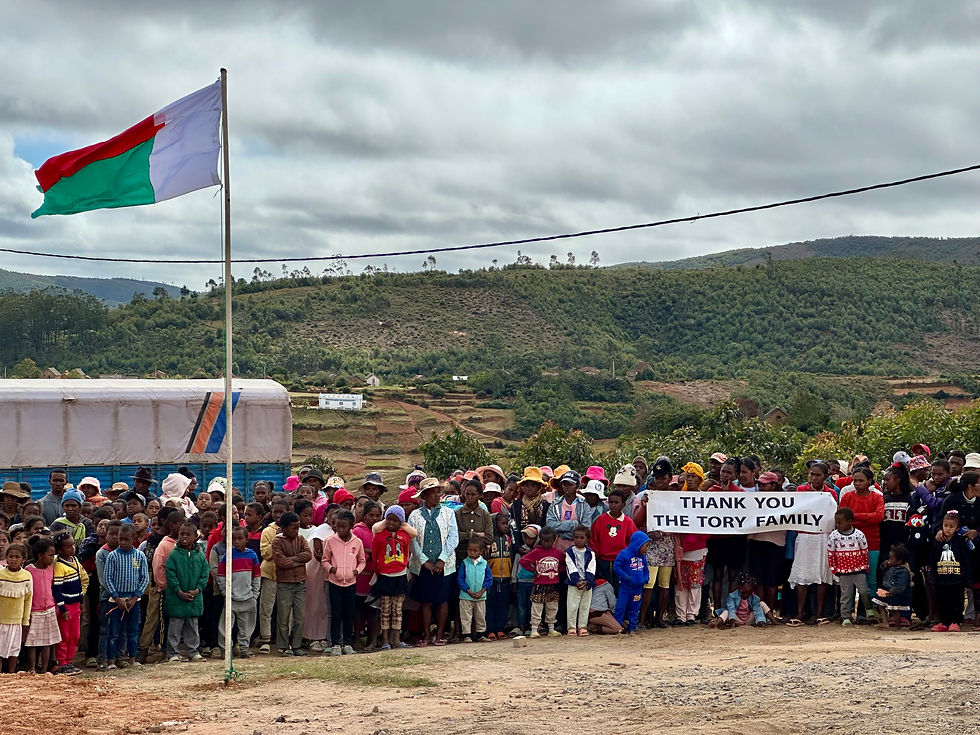Ifalimanjaka Basic Health Centre
inauguration: June 10, 2025 🎉
Thanks to the TORY family for financing this project ❤️
📍Location: Ifalimanjaka,
Rural commune of Ambohitseheno,
District of Manjakadrina,
Region of Analamanga.
💡Objectives:
-
To provide health care facilities in closer proximity to the population.
-
To build a Basic Health Centre (Centre de Santé de Base niveau II, ( CSB II) consisting of 11 rooms, including offices, a consultation room, a pharmacy, a maternity ward and delivery room and waiting room – all conforming to the standards laid down by the Ministry of Health.
-
To provide furniture and medical equipment
-
To provide access to safe drinking water




Build by Jean-Luc RASOAMIARAMANANA's team
Cost
- Basic Health Centre, 11 rooms: Ariary 147,465,156 (£ 26,812)
- Furniture and medical equipment : Ariary 35,691,460 (£ 6,489)
- Ventilation Improved Pit (VIP) latrine and shower- accessible to wheelchair users: Ariary 18,352,850 (£ 3,336)
TOTAL COST: Ariary 201,509,466 (£ 36,638)
BRIEF PROJECT OUTLINE:
Rationale:
The rural population of Ifalimanjaka live in harsh and primitive conditions. Most people in this particularly poor and deprived farming community make their living from agriculture and cattle raising.
The absence of easily accessible and low cost health care is the source of great suffering and hardship to the population on a daily basis. The most common ailments among the population include high blood pressure, diarrhea, malaria, respiratory infections and influenza. In addition, injuries are common among those working on the land using spades and other sharp tools. A Health Centre would enable patients to receive treatment for illness or injury in a timely manner. Pregnant women, mothers and children are particularly vulnerable when needing urgent medical attention. The community needs access to maternity and health care to allow expectant mothers to give birth safely, in dignity and in hygienic conditions – reducing the major public health problem of high maternal and infant morbidity and mortality.
The villagers are aware of the risks of self-medication and the danger of using the services of Traditional Birth Attendants (TBAs). But given the absence of trained medical care and the long distance to the nearest Health Centre they often have no other choice.
The nearest Health Centres are situated in Ambohitseheno, 5kms away, Bedia, 10kms away, and Nanjakana, 13 kms away. During the dry season those seeking medical attention at Ambohitseheno, a journey which due to extreme poverty is invariably undertaken on foot, have a challenging walk of two hours or more. But during the rainy/cyclone season, when the rice fields are flooded and rivers become impassible, they have a journey time of more than five hours. But women in the final stages of pregnancy (and the elderly) are unable to make such a long and arduous journey, and many give birth at home with the assistance of untrained and ill-equipped Traditional Birth Attendants (TBA) – resulting in a high incidence of maternal and infant morbidity a mortality. Furthermore only children delivered by qualified doctors are eligible to have their births registered and a birth certificate issued Children delivered by TBAs who have no birth certificate face many administrative problems in adulthood.
On several occasions the Mayor has appealed to the Ministry of Health to build and equip a Health Centre, but government funds are limited and his frequent appeals all fell on deaf ears.
Main Outputs:
-
Reduce the high rate of mortality and morbidity among pregnant women and improve the availability and quality of medical treatment available to treat those suffering from the most prevalent illnesses, which include hypertension, malaria, diarrhea and respiratory infections etc;
-
Put an end to the number of premature births and deaths that occur during the journey to seek medical assistance;
-
Put an end to the need for the long journeys undertaken by pregnant women and seriously ill patients needing medical help;
-
Improve the level of support for the most vulnerable of community members
